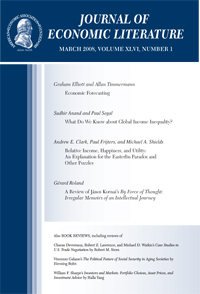现代传染病:宏观经济影响和政策应对
IF 11.5
1区 经济学
Q1 ECONOMICS
引用次数: 0
摘要
我们讨论和回顾自二十世纪后期以来关于流行病和流行病的宏观经济影响的文献。首先,我们将讨论健康在推动经济增长和福祉方面的作用,并讨论评估传染病经济负担的标准框架。其次,我们概述了一个一般的理论框架,以评估政策制定者在处理传染病及其宏观经济影响时必须考虑的权衡。在这样做时,我们强调经济后果对(1)疾病特征的依赖性;(ii)个人之间在易感性、偏好和收入方面的不平等;(三)各国在制度和宏观经济环境方面的异质性。第三,我们研究了旨在减轻和预防传染病及其宏观经济影响的药物和非药物政策。第四,我们讨论了五种传染病的健康损失和经济影响:艾滋病毒/艾滋病、疟疾、结核病、流感和COVID-19。虽然重大流行病和大流行病可能造成巨大的人员伤亡并造成惊人的经济负担,但早期和有针对性的卫生和经济政策干预往往可以在很大程度上减轻这两种情况。(jel e20, h50, i12, i14, i15, i18, j17)本文章由计算机程序翻译,如有差异,请以英文原文为准。
Modern Infectious Diseases: Macroeconomic Impacts and Policy Responses
We discuss and review literature on the macroeconomic effects of epidemics and pandemics since the late twentieth century. First, we cover the role of health in driving economic growth and well-being and discuss standard frameworks for assessing the economic burden of infectious diseases. Second, we sketch a general theoretical framework to evaluate the trade-offs policy makers must consider when addressing infectious diseases and their macroeconomic repercussions. In so doing, we emphasize the dependence of economic consequences on (i) disease characteristics; (ii) inequalities among individuals in terms of susceptibility, preferences, and income; and (iii) cross-country heterogeneities in terms of their institutional and macroeconomic environments. Third, we study pharmaceutical and nonpharmaceutical policies aimed at mitigating and preventing infectious diseases and their macroeconomic repercussions. Fourth, we discuss the health toll and economic impacts of five infectious diseases: HIV/AIDS, malaria, tuberculosis, influenza, and COVID-19. Although major epidemics and pandemics can take an enormous human toll and impose a staggering economic burden, early and targeted health and economic policy interventions can often mitigate both to a substantial degree. (JEL E20, H50, I12, I14, I15, I18, J17)
求助全文
通过发布文献求助,成功后即可免费获取论文全文。
去求助
来源期刊

Journal of Economic Literature
ECONOMICS-
CiteScore
17.80
自引率
0.80%
发文量
49
期刊介绍:
Commencing in 1969, the Journal of Economic Literature (JEL) serves as a vital resource for economists, offering a means to stay informed about the extensive literature in the field. Each JEL issue features commissioned, peer-reviewed survey and review articles, book reviews, an annotated bibliography categorizing new books by subject, and an annual index of dissertations from North American universities.
 求助内容:
求助内容: 应助结果提醒方式:
应助结果提醒方式:


